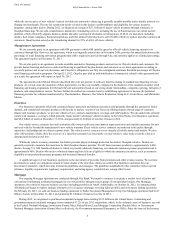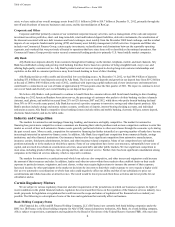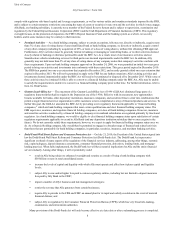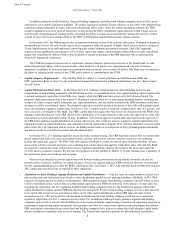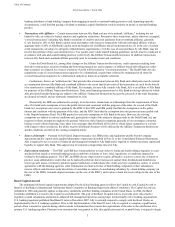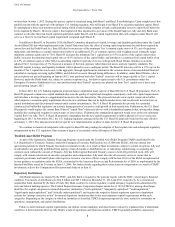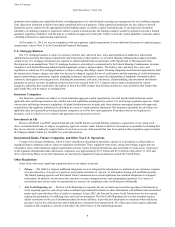Ally Bank 2012 Annual Report Download - page 15
Download and view the complete annual report
Please find page 15 of the 2012 Ally Bank annual report below. You can navigate through the pages in the report by either clicking on the pages listed below, or by using the keyword search tool below to find specific information within the annual report.13
• result in Ally being subject to enhanced oversight and scrutiny as a result of being a bank holding company with $50 billion or more
in consolidated assets;
• affect the levels of capital and liquidity with which Ally must operate and how it plans capital and liquidity levels;
• subject Ally to new and/or higher fees paid to various regulatory entities, including but not limited to deposit insurance fees to the
FDIC;
• impact a number of Ally’s business and risk management strategies;
• restrict the revenue that Ally generates from certain businesses;
• require Ally to provide to the Federal Reserve and FDIC an annual plan for its rapid and orderly resolution in the event of material
financial distress; and
• subject Ally to a new Consumer Financial Protection Bureau (CFPB), which has very broad rule-making, examination, and
enforcement authorities.
In light of the further study and rulemaking required to fully implement the Dodd-Frank Act, as well as the discretion afforded to federal
regulators, the full impact of this legislation on Ally, its business strategies, and financial performance cannot be known at this time and may
not be known for a number of years. In addition, regulations may impact us differently in comparison to other more established financial
institutions. However, these impacts are expected to be substantial and some of them are likely to adversely affect Ally and its financial
performance. The extent to which Ally can adjust its strategies to offset such adverse impacts also is not knowable at this time.
Our business may be adversely affected upon our implementation of the revised capital requirements under the Basel III capital rules.
In December 2010, the Bank for International Settlements’ Basel Committee on Banking Supervision adopted new capital, leverage, and
liquidity guidelines under the Basel Accord (Basel III), which when implemented in the United States, may have the effect of raising capital
requirements beyond those required by current law and the Dodd-Frank Act. In June 2012, the U.S. banking regulators proposed rules to
implement many aspects of Basel III (the U.S. Basel III proposals). The U.S. Basel III proposals contain new capital standards that raise the
quality of capital and strengthen counterparty credit risk capital requirements and introduce a leverage ratio as a supplemental measure to the
risk-based ratio. The proposals include a new capital conservation buffer, which imposes a common equity requirement above the new
minimum that can be depleted under stress, and could result in restrictions on capital distributions and discretionary bonuses under certain
circumstances. The U.S. Basel III proposals also provide for a potential countercyclical buffer that regulators can activate during periods of
excessive credit growth in their jurisdiction. The U.S. Basel III proposals contemplate that the new capital requirements would be phased in
over several years, beginning in 2013. In November 2012, the U.S. banking regulators announced that the U.S. Basel III proposals would not
become effective on January 1, 2013. The announcement did not specify new implementation or phase-in dates for the U.S. Basel III
proposals.
The Basel III rules and the Dodd-Frank Act, when implemented, will over time impose limits on Ally’s ability to meet its regulatory
capital requirements through the use of mortgage servicing rights (MSRs), trust preferred securities, or other “hybrid” securities, if applicable.
At December 31, 2012, Ally had $857 million of MSRs and $2.5 billion of trust preferred securities, which were included as Tier 1 capital.
Ally currently has no other “hybrid” securities outstanding. Pending final U.S. implementation of rules for Basel III and subsequent
regulatory interpretation, there remains a degree of uncertainty on the full impact of Basel III.
If we or Ally Bank fail to satisfy regulatory capital requirements, we or Ally Bank may be subject to serious regulatory sanctions ranging
in severity from being precluded from making acquisitions or engaging in new activities to becoming subject to informal or formal
supervisory actions by the FRB and/or FDIC and, potentially, FDIC receivership of Ally Bank. If any of these were to occur, such actions
could prevent us from successfully executing our business plan and have a material adverse effect on our business, results of operations, and
financial position.
Our business, financial condition, and results of operations could be adversely affected by governmental fiscal and monetary policies.
The actions of the FRB and international central banking authorities directly impact our cost of funds for lending, capital raising, and
investment activities and may impact the value of financial instruments we hold. In addition, such changes in monetary policy may affect the
credit quality of our customers. Changes in domestic and international monetary policy are beyond our control and difficult to predict.
In addition, our business and earnings are significantly affected by the fiscal and monetary policies of the U.S. government and its
agencies. We are particularly affected by the policies of the FRB, which regulates the supply of money and credit in the United States. The
FRB’s policies influence the new and used vehicle financing market, which significantly affects the earnings of our businesses. The FRB’s
policies also influence the yield on our interest earning assets and the cost of our interest-bearing liabilities. Changes in those policies are
beyond our control and difficult to predict and could adversely affect our revenues, profitability, and financial condition.
Table of Contents
Ally Financial Inc. • Form 10-K


